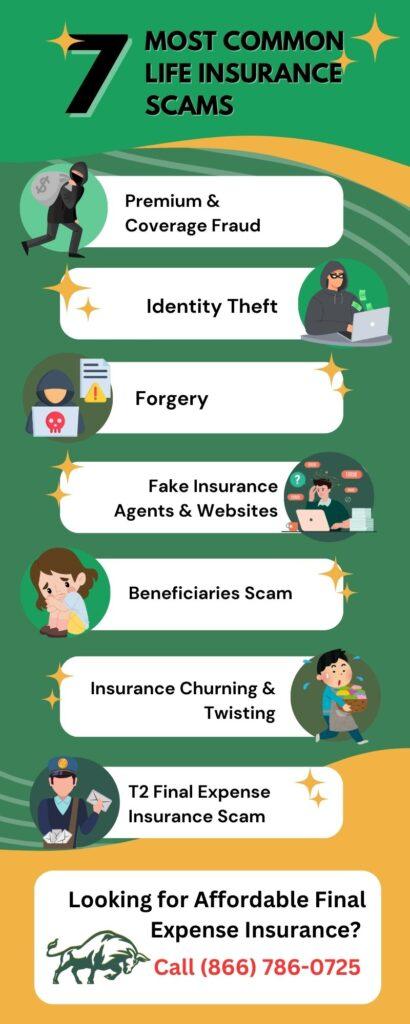The Most Common Life Insurance Scams You Need to Know
Easy Navigation

How Do Life Insurance Scams Work?
Most Common Life Insurance Scams
Premium & Coverage Fraud
Premium and coverage fraud is when an “agent” comes to someone seeking final expense insurance with a series of questions mimicking the medical questionnaire you could be asked. Once you fall for their tricks and send in your monthly premium, they will pocket the money instead of giving you a policy. Your beneficiaries will be left with nothing and the fake agents will pocket those premiums themselves.
Protecting yourself from this scam requires reviewing the policy you agree to and determining if it is legitimate.
Identity Theft
If you’ve already received your insurance policy and are contacted by your insurance provider, confirm who they are before providing any information. Identity thieves will pretend they are coming from your insurance provider and ask for your private information (Social Security number, credit card information, etc.).
Always ask for validation or ask to continue working with the agent that you were working with previously to prevent your identity from getting stolen.
Forgery
Fake Insurance Agents & Websites
Fake insurance agents will set up websites claiming they are insurance sales agents or a team of agents looking for unsuspecting seniors to enter their personal information on the site. Oftentimes, scam websites won’t even sell you anything — they just want your information to use for their gain.
Beneficiaries Scam
Phishing is a scam where a stranger pretends to be from a reputable source through a messaging platform. They always ask for information that can be used to access your accounts which is exactly how beneficiary life insurance scams work.
Scammers prey upon those who recently lost a loved one and will contact them saying that they are entitled to death benefits from a phony policy. They will state that if you want to receive the death benefit, you’ll need to pay for any outstanding premiums and promise millions of dollars once you “pay the $1,000 premium deficit”.
Insurance Churning & Twisting
Churning and twisting are two different life insurance scams that cause policyholders to have less coverage at higher premiums. Essentially, the insurance agent who will contact you prioritizes commission sales over finding your best policy. Here is an example of churning and twisting:
- Churning: You have ABC insurance with the level policy plan. The agent tries to get you to switch to ABC Insurance’s moderated policy plan. This would decrease coverage with the same carrier for you and the agent would get a commission for making a sale.
- Twisting: You have DEF insurance with the level policy plan. The agent tries to get you to switch to ABC Insurance’s level or moderate policy plan. This could result in a higher premium for you with less coverage but a commission bonus for the agent.
Again, most agents are ethical people devoted to their jobs, but there are rare circumstances that will try to call you to get a commission bump. Some states have regulations discouraging agents from doing this, but it isn’t completely illegal.
T2 Final Expense Insurance Scam
What To Do if You Are a Victim of a Life Insurance Scam

How to Protect Yourself From Life Insurance Scams

Here are a few tips and advice to help you avoid life insurance scams and prevent yourself from becoming a victim:
Fill Out Applications Carefully
When you apply for a new life insurance policy, you will be asked to submit a lengthy application. The applications look to see what type of health conditions you may have or what your credit will look like. Review all questions carefully, answer honestly, and take your time filling out the application. Rushing through the application could lead you to write down incorrect information. While minor mistakes may be overlooked, you do not want to make an error that could get your coverage denied.
Stay Informed
Keeping up-to-date with how scammer operates can be a great way to protect yourself from becoming their next victim. Fraudsters are always evolving and figuring out new means to scam vulnerable people out of their money. Here are key pieces of information to remember when it comes to life insurance scams:
- Life insurance websites never ask for your social security number or credit card information. This is reserved for the application.
- Agents can verify themselves by telling you their license number or National Producer Number (NPN). If they refuse or are reluctant to give this information, that is a red flag.
- Agents will never inform you of a missed payment and try to have you correct that with a phone call. Call the insurance company directly if you suspect you missed a payment.
- If your loved one with a life insurance policy has passed, the insurance company must be informed first to contact beneficiaries. Legitimate companies will never contact you without notice but someone pulling a life insurance scam might.
- Companies will never tell you that a premium payment is necessary to receive death benefits. Death benefits can only be given if the policyholder made all payments up to their death.
Review Your Policy
Be sure to get a copy of and read through the insurance policy that you are buying. Review the cancellation terms and determine how much time you have to receive a full refund if you are unhappy with the services you have received.
Ask questions about anything you don’t understand. A reputable company is happy to help you and clear up any confusion. People running life insurance scams will not provide you with any details, or paperwork, nor would they want to answer any questions you may have.
Work with Reputable & Licenced Insurance Agents
Working with agents and companies you can trust is crucial. Final Expense Benefits adheres to a strict code of ethics to ensure you are treated fairly and with the utmost respect and care you deserve.
We are committed to protecting your legacy and loved ones by connecting you to over 20 of the best insurance carriers. We pledge to provide superior customer service, supply you with the highest quality insurance at the lowest cost, and give you peace of mind that all your final expense needs are delicately and thoughtfully taken care of.
Conclusion
- Aetna
- AIG
- Americo
- Mutual of Omaha
- Great Western Insurance Company
- Prosperity Life
- Foresters Insurance
Frequently Asked Questions
How Do Life Insurance Scams Work?
Life insurance scams will ask for your personal information, like your social security number and credit card information. You should never give your information away if you cannot confirm a valid source.
How Can I Avoid Final Expense Insurance Scams?
You can avoid Final Expense Insurance scams by being up-to-date with scammers’ methods and partnering with a trusted insurance brokerage company like Final Expense Benefits.
Will the Government Pay for All My Funeral Expenses?
The government will not pay for all your funeral expenses. If you are eligible for social security, your beneficiaries will only receive $255 they can use toward funeral expenses.
